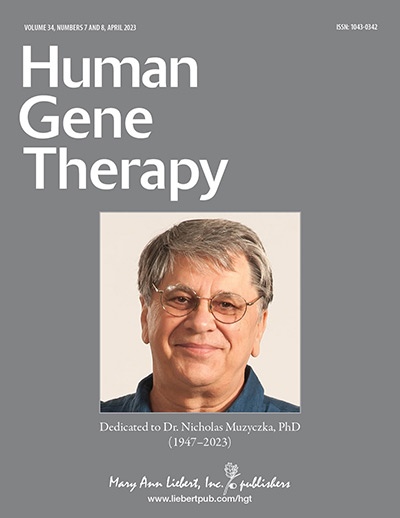For Immediate Release
Assessing Gene Supplementation in a Mouse Model of Retinitis Pigmentosa
Contact: Kathryn Ryan
914-740-2250
kryan@liebertpub.com

New Rochelle, NY, May 23, 2023 —A new study shows that total RPE65 protein levels in mice with autosomal dominant retinitis pigmentosa were doubled following subretinal delivery of adeno-associated virus (AAV)-RPE65 gene supplementation. The study is published in the peer-reviewed journal Human Gene Therapy. Click here to read the article now.
Debra Thompson, from the University of Michigan Medical School, and coauthors, assessed gene supplementation in mice with a monoallelic mutation encoding a rare D477G RPE65 variant (D477G KI mice). Total RPE65 protein levels are decreased in heterozygous D477G KI mice. After treatment, recombinant RPE65 localized specifically to the retinal pigment epithelium and was stable for at least 6 months post-injection.
In addition, report the investigators, “rates of recovery of the chromophore 11-cis retinal after bleaching were significantly increased in eyes that received AAV-RPE65, consistent with increased RPE65 isomerase activity.” They add, “It remains of significant interest to determine whether increase RPE65 expression can reduce the disease burden associated with D477G RPE65.”
“While patients with inherited retinal dystrophy due to RPE65 deficiency can benefit from the FDA approved gene therapy, it has been very unclear whether patients with autosomal dominant retinitis pigmentosa due to the D477G RPE65 mutation could be treated in a similar way,” says Editor-in-Chief Terence R. Flotte, MD, Celia and Isaac Haidak Professor of Medical Education and Dean, Provost, and Executive Deputy Chancellor, University of Massachusetts Chan Medical School. “This study provides important initial proof-of-principle data in support of gene supplementation as a treatment for patients with this mutation.”
About the Journal
Human Gene Therapy, the Official Journal of the European Society of Gene and Cell Therapy and eight other international gene therapy societies, was the first peer-reviewed journal in the field and provides all-inclusive access to the critical pillars of human gene therapy: research, methods, and clinical applications. The Journal is led by Editor-in-Chief Terence R. Flotte, MD, Celia and Isaac Haidak Professor of Medical Education and Dean, Provost, and Executive Deputy Chancellor, University of Massachusetts Chan Medical School, and an esteemed international editorial board. Human Gene Therapy is available in print and online. Complete tables of contents and a sample issue are available on the Human Gene Therapy website.
About the Publisher
Mary Ann Liebert, Inc. is a global media company dedicated to creating, curating, and delivering impactful peer-reviewed research and authoritative content services to advance the fields of biotechnology and the life sciences, specialized clinical medicine, and public health and policy. For complete information, please visit the Mary Ann Liebert, Inc. website.